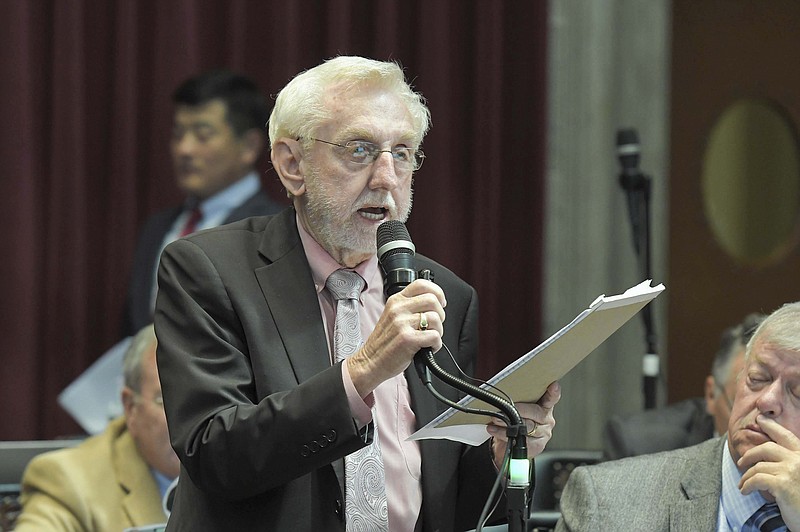Missouri lawmakers are moving to restore the state's presidential preference primary but require voters to register affiliation with a political party before casting a ballot.
After a standalone bill collapsed in the House late last month, a provision to reinstate Missouri's presidential primary was added to a bill considered by a conference committee Monday. As it contains language neither the House nor Senate approved, the bill will go back to both chambers for final passage before the Legislature adjourns Friday.
The bill, SB 96 sponsored by Sen. Andrew Koenig, R-Manchester, is primarily focused on raising the vote threshold local governments have to reach to establish community improvement districts and transportation development districts supported by sales taxes.
The bill left the Senate in early March without any language related to the presidential preference primary. After adding the presidential primary and other election provisions, the House passed the bill May 4 by a vote of 100-34, with 20 representatives voting "present."
Koenig brought another version to Monday's conference committee that makes the presidential preference primary semi-closed, meaning voters must register with a party to get a ballot but can register the same day as voting and change their party registration at any time. That proposal also removed language the House added to require ballot measures related to taxation be given numerical or alphabetical names.
Sen. Mary Elizabeth Coleman, R-Arnold, suggested the committee leave off provisions that made threatening, harassing and sharing personal information of election officials criminal offenses. Sen. Tracy, D-St. Louis County, suggested the committee also ditch a couple provisions dictating language for taxation ballot measures.
Koenig said the committee's proposal would be re-drafted with the changes and that he planned to collect signatures individually to move it along to both chambers.
Democrats on the committee raised concerns that the proposal contains language not vetted by the House or the Senate in previous iterations of the bill.
"It seems like it kind of goes against what we do in this building," McCreery said. "I'm not sure-- I'm just not comfortable with that. And also, the motion on this bill in the Senate, and I think also in the House, was just to conference, not to exceed the differences."
Democrats also questioned what the point of creating a semi-closed primary system was, adding it could discourage participation in elections. Koenig responded it was to discourage voters from switching parties, but his preference was for a closed primary system that wouldn't allow for same-day registration.
"Obviously, this doesn't do that because people are opposed to doing that," he said.
"If you aren't affiliated with a party, I don't think you should be voting in the primary," he added later.
Semi-closed primaries are used by at least one party in 15 states, including Kansas, Nebraska and Oklahoma, according to Ballotpedia.
Missouri has used open presidential preference primaries for the past two decades. The state switched to a caucus system last year after lawmakers approved an omnibus elections bill.
Caucuses are run by political parties and gather registered members of those parties together to assign delegates to candidates. Instead of a ballot, caucuses may require voters to publicly identify the candidate they support and divide themselves into different sections of a room.
Missourians have used primary elections to voice support for presidential candidates since 2000. They are run by the state and rules for participation are determined by laws.
There's been a bipartisan push to reinstate the presidential preference primary since it was removed last year. It faltered after the House defeated a standalone bill April 24 because of disagreements over when the primary election should be held.
The House took a second shot May 4 by amending and passing Koenig's SB 96.
The bill had an April primary date, which is what the House defeated a few weeks prior, until Rep. Ben Baker, a Neosho Republican and the underlying bill handler in the House, added an amendment that changed the date to the first Tuesday after the first Monday in March.
Opposition to a March date came from local election authorities concerned about the logistics of administering municipal and presidential primary elections within the span of a few weeks.
"This is the negotiated language, I believe to reach consensus on the issue," Baker said from the House floor last week, adding it came from the Senate chamber.
Rep. Peter Merideth, D-St. Louis, previously voted "present" on the presidential primary bill because it contained the April date and said May 4 that he was happy to see the March date restored.
"I'm glad that this is at least getting back to this (March date)," he said from the House floor. "I actually hope that the Senate might strip some of this other stuff out of here before this actually makes it to the finish line, but I'm glad to see this moving even though I don't support the piece about (community improvement districts)."
Members of the House attempted to add several amendments to the bill. The only one to gain approval was an amendment version of HB 783 to curb some provisions of the omnibus elections bill passed last year.
Baker told his House colleagues the bill was in a "very precarious position" and urged against changes heading into conference with the Senate.
"I think if anything else gets added to this bill, it could be a problem. I think that it's going to get stripped out in conference committee anyway," he said.
Rep. Rudy Veit, a Wardsville Republican who sponsored the standalone bill to reinstate the presidential preference primary, agreed.
"It isn't the perfect time right now to add all the amendments," he told his House colleagues. "I ask you to stand by the March date, which seems to be the one that the senators want and the majority of the people want, and let's close this up."
SB 96: Modifies provisions relating to votes in political subdivisions
Sponsor: Sen. Andrew Koenig, R-Manchester

